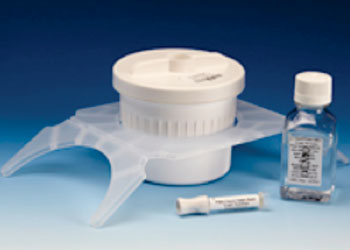Improved Colon Cancer Diagnosis with Multitargeted DNA Biomarker Test
By LabMedica International staff writers
Posted on 31 Mar 2014
A large-scale clinical study showed that a noninvasive test that detects several DNA biomarkers and blood in stool samples was significantly more sensitive than the currently used fecal immunochemical test (FIT) for diagnosis of colorectal cancer.Posted on 31 Mar 2014
The Exact Sciences (Madison, WI, USA) Cologuard test includes quantitative molecular assays for KRAS mutations, aberrant NDRG4 and BMP3 methylation, and beta-actin, plus a hemoglobin immunoassay. It was compared to a commercially available FIT assay and to the colonoscopy "gold standard" in a screen of nearly 10,000 patients.

Image: Cologuard, a new colorectal cancer screening test in development, was able to detect 92% of colon cancers in a large clinical study (Photo courtesy of Exact Sciences).
Colonoscopy examinations of the 9,989 participants who could be evaluated detected 65 (0.7%) with colorectal cancer and 757 (7.6%) with advanced precancerous lesions. Comparing these results to the DNA assay and FIT revealed that the sensitivity for detecting colorectal cancer was 92.3% with DNA testing and 73.8% with FIT. The sensitivity for detecting advanced precancerous lesions was 42.4% with DNA testing and 23.8% with FIT. The rate of detection of polyps with high-grade dysplasia was 69.2% with DNA testing and 46.2% with FIT; the rates of detection of serrated sessile polyps measuring one centimeter or more were 42.4% and 5.1%, respectively. Specificities with DNA testing and FIT were 86.6% and 94.9%, respectively. Among participants with nonadvanced or negative findings on colonoscopy the results were 89.8% and 96.4%, respectively. Thus, while the DNA test was more sensitive than the FIT test, it did produce more false positive results, which would have led to unnecessary colonoscopies.
“Cologuard detection rates of early stage cancer and high-risk precancerous polyps validated in this large study were outstanding and have not been achieved by other noninvasive approaches,” said contributing author Dr. David Ahlquist, a gastroenterologist at the Mayo Clinic (Rochester, MN, USA) and co-inventor of the Cologuard test. “It is our hope that this accurate and user-friendly test will expand screening effectiveness and help curb colorectal cancer rates in much the same way as regular Pap smear screening has done for cervical cancer.”
The study was published in March 19, 2014, online edition of the New England Journal of Medicine.
Related Links:
Exact Sciences
Mayo Clinic














